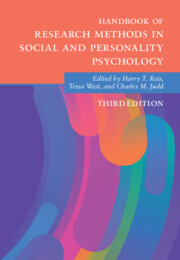Book contents
- Handbook of Research Methods in Social and Personality Psychology
- Cambridge Handbooks in Psychology
- Handbook of Research Methods in Social and Personality Psychology
- Copyright page
- Contents
- Figures
- Tables
- Contributors
- Introduction
- 1 The Romance of Research Methods
- Part I Before You Dive In
- Part II Basic Design Considerations to Know, No Matter What Your Research Is About
- Part III Deep Dives on Methods and Tools for Testing Your Question of Interest
- 10 Survey Research
- 11 Conducting Surveys and Experiments on the Internet
- 12 Methods for Studying Everyday Experience in Its Natural Context
- 13 Mobile Sensing Methods
- 14 Language Research in Social Personality Psychology
- 15 Collecting Digital Footprints in the Wild
- 16 Behavioral Observation and Coding
- 17 Automaticity and Implicit Measures
- 18 Social Neuroendocrinology
- 19 Multivariate Neuroimaging in Social and Personality Psychology
- Part IV Understanding What Your Data Are Telling You About Psychological Processes
- Index
- References
12 - Methods for Studying Everyday Experience in Its Natural Context
from Part III - Deep Dives on Methods and Tools for Testing Your Question of Interest
Published online by Cambridge University Press: 12 December 2024
- Handbook of Research Methods in Social and Personality Psychology
- Cambridge Handbooks in Psychology
- Handbook of Research Methods in Social and Personality Psychology
- Copyright page
- Contents
- Figures
- Tables
- Contributors
- Introduction
- 1 The Romance of Research Methods
- Part I Before You Dive In
- Part II Basic Design Considerations to Know, No Matter What Your Research Is About
- Part III Deep Dives on Methods and Tools for Testing Your Question of Interest
- 10 Survey Research
- 11 Conducting Surveys and Experiments on the Internet
- 12 Methods for Studying Everyday Experience in Its Natural Context
- 13 Mobile Sensing Methods
- 14 Language Research in Social Personality Psychology
- 15 Collecting Digital Footprints in the Wild
- 16 Behavioral Observation and Coding
- 17 Automaticity and Implicit Measures
- 18 Social Neuroendocrinology
- 19 Multivariate Neuroimaging in Social and Personality Psychology
- Part IV Understanding What Your Data Are Telling You About Psychological Processes
- Index
- References
Summary
In the past three decades, methods that go by the generic name of everyday-experience methods have matured from the status of promising innovations to standard, widely used tools. This term refers to a paradigm that examines social psychological theories and phenomena in the ebb and flow of everyday activity, as it is displayed in its natural context. This technique, which includes daily diary studies, experience sampling, and ecological momentary assessment, has become remarkably popular in the past two decades, so much so that all researchers must be familiar with its advantages and limitations. The current chapter aims to help budding researchers become familiar with this tool and its potential for expanding the validity, relevance, and usefulness of our research.
Keywords
Information
- Type
- Chapter
- Information
- Publisher: Cambridge University PressPrint publication year: 2024
